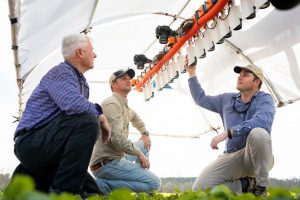What is Precision Agriculture?
Agriculture production highly depends on water and soil factors. Not long ago, farming practices were fairly uniform. It was difficult for farmers to treat site-specifically based on land variability and soil characteristics. There is an increasing need to utilize resources more efficiently. Nowadays in particular, there have been important concerns regarding the long-term impact of soil and water supplies, because they are no longer considered inexhaustible or plentiful resources. Precision agriculture, through the set of information technologies that it uses, allows to effectively manage these resources.

The easiest way to understand precision agriculture is to think of it as everything that makes the practices of farming more precise. A key component of this approach is the use of information technology.
Common Technologies Used in Precision Agriculture
Precision Agriculture is not a new concept. It has been around since mid-80s. The advancement of technologies allows the concept of precision agriculture to be realized in a practical production setting. Because technology is an essential component, precision agriculture often has been defined by the technologies that enable it. For example, the utilize of GPS (Global Positioning System) in agriculture is called GPS agriculture or GPS farming. Growers who effectively use information earn higher returns than those who don’t.
In addition, precision agriculture is a systems approach to farming. To be viable, both economic and environmental benefits must be considered, as well as the practical questions of field-level management and the needed alliances to provide the infrastructure for technologies.
The most commonly adopted technologies include GPS, yield monitoring and mapping, variable rate technology, and remote sensing.
- Global Positioning System: This technology allows farmers to obtain precise location information at any time allows soil and crop measurements to be mapped.
- Yield Monitoring and Mapping: This technology measures and record yield information in conjunction with a GPS.
- Variable Rate Technology: This technology allows farmers to apply different rates of fertilizer at each location across fields.
- Remote Sensing: This technology allows the collection of data from a distance. It can reveal in-season variability that affects crop yield, and can be timely enough to make management decisions that improve profitability for the current crop.
Challenges of Technology Adoption
The adoption of precision agriculture technologies is lower than expectation. The initial investment is still a main challenge. Studies reveals adoption of these technologies can result in an average of 15 to 20 dollars saving on one acre of operation, but it is still perceived as a long-term investment. In addition, the complexity of the novel technologies that are used in precision agriculture implies a greater degree of learning skills for their correct adoption and management. The growers are required to possess a minimum knowledge to select right technology and operate it.
Precision agriculture can address both economic and environmental issues that surround production agriculture today. It is clear that many farmers are at a sufficient level of management that they can benefit from precision management. Questions remain about cost-effectiveness and the most effective ways to use the technological tools we now have, but the concept of “doing the right thing in the right place at the right time” has a strong intuitive appeal. Ultimately, the success of precision agriculture depends largely on how well and how quickly the knowledge needed to guide the new technologies can be found.
 0
0
